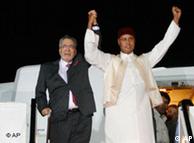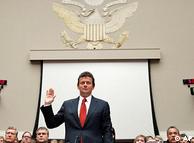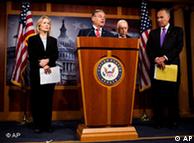TERRORISM | 23.07.2010
US Senate to probe possible links between BP and the release of the Lockerbie bomber
The senators were incensed. In an open letter to the US Secretary of State on July 13, four Democratic lawmakers urged Hillary Clinton to fully investigate reports about a possible link between BP and the release of the convicted Lockerbie bomber by the British government. "The question we now have to answer is, was this corporation willing to trade justice in the murder of 270 innocent people for oil profits?" the senators ask in their letter.
On July 29, the Senate foreign relations committee will convene a hearing on the issue.
At the heart of the case is Abdelbaset al-Megrahi, a Libyan national who was convicted of blowing up Pan Am flight 103 in 1988 over the Scottish village of Lockerbie. 270 people, including 189 Americans, were killed in the downing of the airliner. Al-Megrahi was released in August last year on compassionate grounds because he was diagnosed with a terminal illness. His release and the subsequent hero's welcome he received in Libya caused a public outcry in the US.
BP lobbied for a prisoner deal, not for al-Megrahi
Two days after the senators' letter was published, BP admitted that it had in fact lobbied the British government in 2007 over a prisoner transfer agreement with Libya because it was concerned a slow resolution would impact an offshore drilling deal with Libya.
The prisoner deal was ultimately agreed upon by the British government in 2007, the same year BP reached an exploration deal worth 900 million dollars with Libya.
While BP admitted lobbying for the prisoner deal, it said it was not involved in discussions about the freeing of al-Megrahi.
"The decision to release al-Megrahi in August 2009 was taken by the Scottish government," BP said in a statement on July 15 "It is not for BP to comment on the decision of the Scottish government. BP was not involved in any such discussions about the release of al-Megrahi."
According to the oil company's statement, "BP told the UK government that we were concerned about the slow progress that was being made in concluding a prisoner transfer agreement with Libya."
"We were aware that this could have a negative impact on UK commercial interests, including the ratification by the Libyan government of BP's exploration agreement," the statement read.
Lobbying power house
Asked whether he was surprised about BP's admitted lobbying for a controversial prisoner release deal with Libya, Thomas Seifert, who wrote an acclaimed book on the oil industry and works as foreign affairs editor at the Austrian daily "Die Presse", is unequivocal:
 Abdelbaset al-Megrahi was welcomed in Tripoli by the Libyan leader's son, Seif al-Islam Gadhafi"No, not at all," he said. "It's about a 900 million dollar deal in Libya and that's why BP lobbied. And that's not a crime, and of course they can do that. We all can lobby our governments for better schools and universities or things like that. But of course it helps quite a bit if you have the firepower of multi-billion dollar companies to pay lobbyists who have gone the revolving door in and out of governments and have a pretty good network in the governments."
Abdelbaset al-Megrahi was welcomed in Tripoli by the Libyan leader's son, Seif al-Islam Gadhafi"No, not at all," he said. "It's about a 900 million dollar deal in Libya and that's why BP lobbied. And that's not a crime, and of course they can do that. We all can lobby our governments for better schools and universities or things like that. But of course it helps quite a bit if you have the firepower of multi-billion dollar companies to pay lobbyists who have gone the revolving door in and out of governments and have a pretty good network in the governments."
Dave Levinthal, communications director with the Center for Responsive Politics in Washington, which runs the lobbying clearinghouse opensecrets.org, put the current case of BP's lobbying for a prisoner deal in a larger context:
"Certainly what we see in the United States is that BP, particularly in recent years, has really spent a considerable amount of money on lobbying efforts and lobbying federal level politicians in the United States. So it does serve to reason that they would be doing similar things, be it in Britain or otherwise in Europe when it comes to political lobbying."
According to Levinthal, BP spent more than 15 million dollars last year alone for lobbying the US federal government. That ranks the company fourth among all oil and gas related corporations in terms of lobbying expenditure. Only ExxonMobil, Chevron, ConocoPhilips spent more money lobbying the US government than BP.
"It's important to note that they have a small army of lobbyists," said Levinthal. They have literally dozens of people who lobby on their behalf and when you consider just that mere fact, they have a lot of resources to draw from."
Friends lobbying friends
But perhaps even more important than the sheer amount of money poured into lobbying is the cadre of people BP hires to do the job.
"When you go a little bit deeper you notice that many of the people BP has hired as lobbyists are actually former government officials," said Levinthal. "They are in some cases former federal level staffers, they are former Congressional staffers, in some cases they are even former members of Congress."
 Last month, BP CEO Tony Hayward had to testify on Capitol Hill about the oil spill in the Gulf of Mexico
Last month, BP CEO Tony Hayward had to testify on Capitol Hill about the oil spill in the Gulf of Mexico
For companies like BP it makes perfect sense to hire people who know the political system. "These are people who have worked in the government, these are people who have friends in the government", said Levinthal. "And just like if you wanted to try to convince your friend to do something, you probably have a much better chance of convincing your friend to do what you want than a perfect stranger."
Details of lobbying usually don't become public
Apparently that is also how BP lobbied the British government over the prisoner transfer deal. According to the "Wall Street Journal," BP told the paper that a special adviser to BP who had previously worked for the British intelligence service MI6 had raised the prisoner transfer agreement, but not the specific case of al Mehgrahi, with then-Justice Secretary Jack Straw.
Although it is easy to single out BP for criticism for their lobbying practices, that's not really fair, notes Thomas Seifert: "If you have a certain size of an industry or of a company then basically the interest of this company might coincide with the interest of this country. We are talking about thousands of jobs; we are talking about providing the energy infrastructure, providing the lifeblood of our whole industrial system, so it's pretty significant."
What's more, adds Seifert, most other international energy companies are also engaged in lobbying all over the world to get access to oil and gas reserves. However, what is unusual about the BP case is not necessarily the lobbying efforts themselves, but the fact that this kind of detailed information has become public. Perhaps the senators will unearth even more aspects of BP's efforts to influence the British government in their hearing on the case.
Author: Michael Knigge
Editor: Kristin Zeier


No comments:
Post a Comment